Embracing Resilience: Navigating Childhood Cancer Support
Facing a child’s cancer diagnosis thrusts families into an overwhelming journey filled with fear, uncertainty, and profound challenges. Yet within this storm lies the potential for incredible strength and resilience. Childhood cancer support offers critical lifelines, helping families find hope and steady footing amid the chaos. This guide explores practical strategies and compassionate resources designed to empower parents and caregivers, fostering strength when navigating the difficult path of childhood cancer.
Understanding the Emotional Impact on Families
The emotional upheaval following a childhood cancer diagnosis can feel all-consuming. Parents often experience a complex mix of anxiety, grief, guilt, and helplessness.
Common Emotional Responses and Their Effects
– Shock and denial may delay emotional processing.
– Chronic stress can lead to exhaustion and burnout.
– Guilt about feeling anger or despair is common but can isolate caregivers.
– Sibling jealousy or neglect can create additional family tension.
Recognizing these emotional responses is a crucial step in seeking appropriate childhood cancer support. Accepting these feelings without judgment allows parents to build emotional resilience gradually.
The Role of Emotional Support Networks
Connecting with others who understand your experience is invaluable. Support can come from:
– Professional counselors specializing in pediatric oncology.
– Peer support groups for parents and families.
– Online communities offering 24/7 engagement and resources.
Engaging with support networks reduces feelings of isolation and provides practical advice born from lived experience.
Building Practical Strength Through Knowledge and Preparation
Knowledge is a powerful tool to regain control amidst uncertainty. Becoming informed about your child’s diagnosis, treatment options, and care plan helps reduce anxiety and empowers decision-making.
Learning About the Diagnosis and Treatment
Request comprehensive briefings from your healthcare team. Key information to understand includes:
– Type and stage of cancer.
– Treatment modalities (chemotherapy, radiotherapy, surgery).
– Potential side effects and how to manage them.
– Expected timeline and goals of treatment.
Having clear, accurate information supports advocacy for your child and facilitates communication with extended family and friends.
Organizing Care and Daily Life
Practical childhood cancer support isn’t just medical—it extends to managing daily life logistics. Tips for organizing care include:
– Creating a treatment calendar with appointments and medication schedules.
– Coordinating with schools for educational accommodations.
– Seeking help for household tasks, such as meal preparation and childcare.
Developing routines helps families maintain a sense of normalcy and protects valuable emotional energy.
Self-Care Strategies to Sustain Strength
Supporting a child with cancer demands ongoing energy and focus. Prioritizing your own well-being is essential to maintain resilience.
Physical Self-Care Practices
– Ensure adequate sleep as much as possible.
– Engage in light physical activities like walking or stretching.
– Maintain balanced, nourishing meals even during stressful periods.
Physical wellness influences emotional stability and clarity of thought.
Mental and Emotional Self-Care
– Practice mindfulness or meditation to manage anxiety.
– Journal feelings and experiences as a form of emotional release.
– Set aside moments for activities that bring joy or relaxation.
Even brief self-care moments nurture strength and prevent caregiver fatigue.
Leveraging Childhood Cancer Support Resources
Numerous organizations and programs exist specifically to assist families dealing with childhood cancer.
Medical and Psychosocial Support Services
Hospitals and cancer centers often provide multidisciplinary teams offering:
– Social workers to assist with financial and logistical issues.
– Child life specialists to support children’s emotional well-being.
– Palliative care teams focusing on symptom management and quality of life.
Harnessing these supports can significantly ease the caregiving burden.
Community-Based and Online Resources
Families can access:
– National cancer organizations with educational materials (e.g., American Childhood Cancer Organization).
– Local support groups providing peer connection.
– Online forums and virtual support groups offering flexible engagement.
Participating in these networks adds layers of support that reinforce family strength.
Nurturing Hope and Positivity Amid Challenges
Sustaining hope in the face of childhood cancer is vital yet difficult.
Embracing Moments of Joy
Celebrate small victories—successful treatments, good days, or milestones. Positivity helps balance the emotional toll and invigorates perseverance.
Setting Realistic Goals and Expectations
Recognize that setbacks are part of the journey. Adjusting goals to align with current realities preserves motivation and fosters resilience.
Expressing Gratitude and Finding Meaning
Many families find strength by focusing on what they can be thankful for or by engaging in meaningful activities such as advocacy or creative expression. These acts create purpose beyond the illness.
Encouraging Community and Advocacy Engagement
Connecting with the broader childhood cancer community can provide purpose while enhancing support.
Participating in Awareness and Fundraising Events
Engagement in runs, walks, or campaigns raises funds and awareness and connects you to others with shared experiences.
Advocating for Childhood Cancer Support
Become a voice for improved research funding, better care facilities, or policies supporting families. Advocacy can transform personal struggle into impactful action.
Summary and Next Steps
Finding strength when your child has cancer involves embracing emotional honesty, gaining knowledge, prioritizing self-care, and connecting with supportive communities. Childhood cancer support is multifaceted, encompassing emotional, practical, and social aspects that empower families to face challenges with resilience.
If you or someone you know is navigating this journey, start by seeking trusted support networks and resources. Remember, you are not alone, and strength builds through connection and informed action. For further assistance and personalized guidance, visit khmuhtadin.com to explore compassionate support options today.



